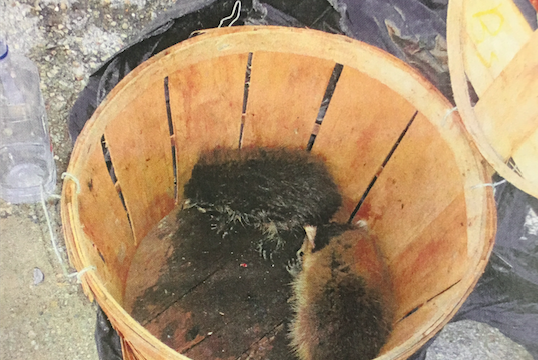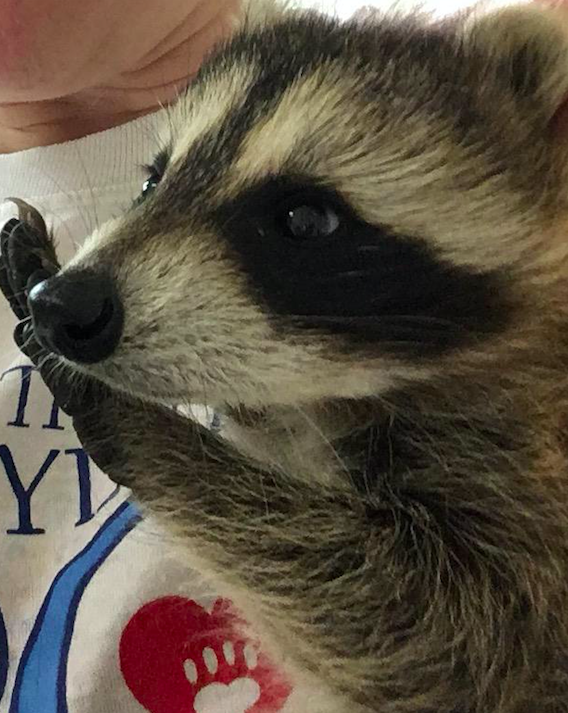
June 08, 2017
 Source/Pennsylvania SPCA
Source/Pennsylvania SPCA
Two baby raccoons were found in a tied trash bag in the area of Lawrence Street off Pattison and Packer avenues in South Philadelphia.
The Pennsylvania SPCA is seeking the public's help in gathering information about the disposal of two live baby raccoons found stuffed in a tied trash bag in South Philadelphia last weekend.
Investigators said the discovery was made by a good Samaritan in the area of Lawrence Street off Pattison and Packer avenues. The PSPCA was contacted by the Philadelphia Animal Care and Control Team (ACCT) after the individual who found the bag attempted to move it and realized there were living animals inside.
Uncertain of what was inside the bag, the PSPCA deployed a Humane Law Enforcement officer to investigate. The officer found two juvenile raccoons, one of them in need of immediate medical attention. Both raccoons were transported to the PSPCA's Shelter Hospital, where they received care and were deemed stable.
The raccoons have since been transferred to the Schuylkill Center's Wildlife Clinic for additional monitoring. Officials hope the animals can ultimately be released back into the wild.
Baby raccoon recovers at PSPCA Shelter Hospital. 
Those responsible for trapping the raccoons could be subject to charges from the PSPCA under the cruelty statutes, with additional charges possible from the Pennsylvania Game Commission.
The incident comes less than a month after Philadelphia City Council held a hearing about the "growing menace" of raccoons in several neighborhoods, including Center City, Southwest Philadelphia and West Philadelphia. Currently, no one city agency is dedicated to managing Philadelphia's raccoon population, but the ACCT does handle a particular set complaints as defined by their contract with the city.
"Our responsibility as an organization is to perform animal control services, which are different from pest services and animal cruelty investigations," said Audra Houghton, ACCT's director of operations.
Not all cities are set up this way, Houghton explained, but there are clear differences between the skills and training required of pest control specialists and how the ACCT is equipped to handle wildlife. The organization, primarily tasked with managing cats and dogs, only deals with raccoons when they are in a resident's direct living space (a bedroom, not an attic) or when they are reported sick or injured.
"Our primary responsibility to respond to a risk," Houghton said, noting that ACCT discourages the public from handling wildlife, especially rabies vector species such as raccoons. "Our only option, usually, is euthanasia."
In the South Philadelphia case, PSPCA intervened because cruelty to the raccoons was involved. But despite the ACCT's default to euthanasia in the majority of raccoon incidents, Houghton said that if two healthy juvenile raccoons came into the agency's hands, ACCT can and would attempt to find a place for them.
"We can send them to Schuylkill," Houghton said. "If a person's health and safety are not at risk, we would make every effort to do that. What happens with them is a decision made by a veterinarian. We have to check on the shelter's capacity and availability. Infant wildlife often require intensive care and bottle-feeding."
So far, after City Council's hearing on raccoons, no changes have been made to ACCT's contract with Philadelphia, Houghton said. Still, the agency is looking for ways to help address the problem.
"We do work with other agencies and continue to look for solutions that will help the public in protecting their properties.," Houghton said. "We're definitely going to continue to research and work with other organizations to provide resources for citizens."